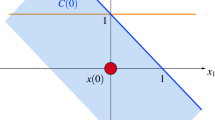Abstract
Hybrid control systems are described by a family of continuous subsystems and a set of logic rules for switching between them. This paper concerns a broad class of optimization problems for hybrid systems, in which the continuous subsystems are modelled as differential inclusions. The formulation allows endpoint constraints and a general objective function that includes “transaction costs” associated with abrupt changes of discrete and continuous states, and terms associated with continuous control action as well as the terminal value of the continuous state. In consequence of the endpoint constraints, the value function m ay be discontinuous. It is shown that the collection of value functions (associated with all discrete states) is the unique lower semicontinuous solution of a system of generalized Bensoussan-Lions type quasi-variational inequalities, suitably interpreted for nondifferentiable, extended valued functions. It is also shown how optimal strategies and value functions are related. The proof techniques are system theoretic, i.e., based on the construction of state trajectories with suitable properties. A distinctive feature of the analysis is that it permits an infinite set of discrete states.
Similar content being viewed by others
References
J. P. Aubin, Mathematical methods of game andeconomic theory. North-Holland, Amsterdam (1982).
J. P. Aubin, Viability theory. Birkhäuser, Boston (1991).
J. P. Aubin, Lyapunov functions for impulse and hybrid controlsystems. Proc. 39th Conf. Decision and Control, Sydney (2000), 466–471.
J. P. Aubin, Optimal impulse control problems andquasi-variational inequalities thirty years later. In: Optimal control and partial differential equations (J. Menaldi et al., eds), IOS Press, Paris (2001), 311-324.
J. P. Aubin, J. Lygeros,S. Sastry, and N. Seube, Impulse differential inclusions: a viability approach to hybrid systems. IEEE Trans. Automat. Control 47 (2002), 2-20.
G. Barles, Deterministic impulse controlproblems. SIAM J. Control Optim. 23 (1985), 419-432.
E. N. Barron and R. Jensen, Semicontinuous viscositysolutions for Hamilton–Jacobi equations with convex Hamiltonians. Comm. Partial Differential Equations 15 (1990), 1713-1742.
M. S. Branicky, V. S. Borkar, and S. K. Mitter, Aunified framework for hybrid control: model and optimal control theory. IEEE Trans. Automat. Control 43 (1998), 31-45.
A. Bensoussanand J. L. Lions, Contrôle impulsionnel et inéquations quasi-variationelles. Bordas, Paris (1982).
I. Capuzzo-Dolcetta and L. C. Evans, Optimal switching for ordinary differential equations. SIAM J. Control Optim. 22 (1984), 143-161.
F. H. Clarke, Yu. S. Ledyaev, R. J. Stern, and P. R. Wolenski, Non-smooth analysis and control theory. Grad. Texts Math. 178, Springer-Verlag, Berlin (1998).
H. Frankowska,Lower semicontinuous solutions to the Hamilton–Jacobi equation. SIAM J. Control Optim. 31 (1993), 257-272.
M. Mottaand F. Rampazzo, Dynamic programming for nonlinear systems driven by ordinary and impulsive controls. SIAM J. Control Optim. 34 (1996), 199-225.
R. B. Vinter, Optimal control.Birkhäuser, Boston (2000).
P. R. Wolenski andY. Zhuang, Proximal analysis and the minimal time problem. SIAM J. Control Optim. 36 (1998), 1048-1078.
J. Yong,Systems governed by ordinary differential equations with continuous, switching and impulse controls. Appl. Math. Optim. 20 (1989), 223-235.
Author information
Authors and Affiliations
Rights and permissions
About this article
Cite this article
Galbraith, G.N., Vinter, R.B. Optimal Control of Hybrid Systems with an Infinite Set of Discrete States. Journal of Dynamical and Control Systems 9, 563–584 (2003). https://doi.org/10.1023/A:1025600503195
Issue Date:
DOI: https://doi.org/10.1023/A:1025600503195




